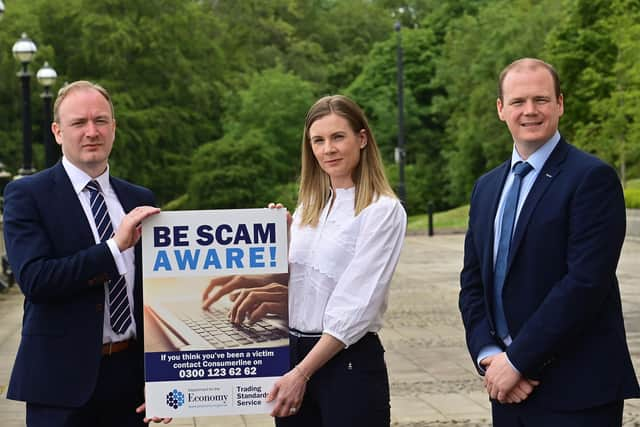Beware of scammers as the cost-of-living crisis bites warns Trading Standards Service
and live on Freeview channel 276
New research by Citizens Advice has found that millions of people have been targeted by scammers as the cost-of-living crisis continues to take hold.
Ahead of many households receiving vital government help for the cost-of-living crisis, TSS in conjunction with the UK’s Consumer Protection Partnership, has launched its annual Scams Awareness campaign to help people protect themselves from opportunistic scammers.
Advertisement
Advertisement
Economy Minister, Gordon Lyons, said: “We know scammers prey on our worries and fears and the cost-of-living crisis is no exception.


“As the purse strings are tightened and financial pressures pile on, it is more important than ever we recognise the red flags.
“Anyone can fall victim to a scam.
“People of all ages and backgrounds get scammed.
“It is important to be on your guard – if you are not sure about something, take your time and get advice.”
Damien Doherty, Chief Inspector for Northern Ireland Trading Standards Service, added: “Unfortunately we have seen over many years that scammers seek to exploit vulnerability.
Advertisement
Advertisement
“During times of difficulty, we often see a corresponding increase in relating scams and from early data, the cost-of-living crisis seems to be no different.
“TSS has seen a range of different cost-of-living scam tactics used by scammers including impersonation scams and cryptocurrency scams.
“With more than three quarters of UK adults having said that they have been targeted by a scammer this year, a 14 per cent increase compared to this time last year, if you think someone might be trying to scam you, it is important to act straight away.
“If you need advice, guidance or support please call Consumerline on 0300 123 6262 or log on to their website.”
Advertisement
Advertisement
Some of the most common types of scams reported to TSS include:
Deliveries, postal or courier services smishing scams
Someone offering a fake investment or financial ‘get rich quick’ schemes
Someone pretending to be from the government or HMRC
Someone pretending to be from your bank
Online Shopping
Fake loan scams
Health or medical
Energy scams
If you have been scammed:
Talk to your bank or card company immediately if you have handed over any financial and sensitive information or made a payment.
Report the scam to Action Fraud on 0300 123 2040, use the Action Fraud online reporting tool, and contact Consumerline on 0300 123 6262 for advice.
Advertisement
Advertisement
Text scams can be reported to your mobile phone provider by forwarding it to 7726 (SPAM)
Beware of follow up scams. Sometimes after reporting a scam, you might get targeted again by a fraudster who says they can get your money back. Change your contact details- sadly, if you have been scammed once, you are more likely to be targeted again. It might be worth changing your number and/or email address if you are being bombarded by cold calls and spam.